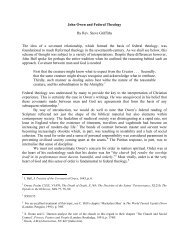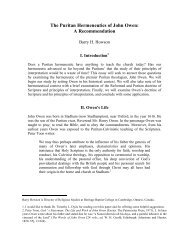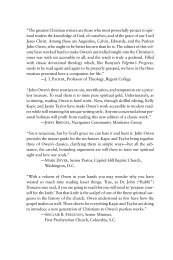M.TH. LONG DISSERTATION (LD6.1) - John Owen
M.TH. LONG DISSERTATION (LD6.1) - John Owen
M.TH. LONG DISSERTATION (LD6.1) - John Owen
Create successful ePaper yourself
Turn your PDF publications into a flip-book with our unique Google optimized e-Paper software.
<strong>John</strong> <strong>Owen</strong>’s Theological Context<br />
interested in issues of continuity and discontinuity between the medieval period, the<br />
Reformation, and later Reformed thought. 16<br />
The main change is a shift from dogmatically driven studies of seventeenth<br />
century theology (the first three groups) to more narrowly focussed historical expositions<br />
(the fifth group). 17 In <strong>John</strong> <strong>Owen</strong> research 18 this last group is represented particularly by<br />
Carl Trueman 19 and Sebastian Rehnman. 20<br />
The aim of Muller, Trueman, et al is to provide balanced historical expositions<br />
that take particular account of the contextual setting of their subjects. They are generally<br />
hostile to dogmatic approaches to church history, placing a high value on ‘objectivity’<br />
and regarding the role of the historian as one simply of exposition, not evaluation. Thus,<br />
Trueman prefaces his monograph on <strong>Owen</strong> with this caveat:<br />
I wish at the start to make it clear that I write as a historian of ideas, not as a<br />
systematic theologian. My interest is not to discover whether <strong>Owen</strong> was right<br />
or wrong, but to see what he said, why he said it, whether it was coherent by<br />
the standards of his day, and how he fits into the theological context of his<br />
own times and of the western tradition as a whole. Of course, I do have<br />
personal intellectual convictions about the theological value of <strong>Owen</strong>’s<br />
writings, but I have tried to be aware of my own theological commitments<br />
and to keep them as separate as humanly possible from my analysis. 21<br />
Muller is, if anything, even stronger: ‘The insertion of one’s own theological premises<br />
into a historical analysis – often with polemical intention – only muddies the waters and<br />
16 Most prominently, Willem van Asselt, Olivier Fatio, Eef Dekker, Anton Vos, Carl Trueman, Martin<br />
Klauber, Lyle Bierma, and Muller himself.<br />
17 Muller 2003a: 3.<br />
18 For an extensive review of research on <strong>John</strong> <strong>Owen</strong> up to and including 1999, see Kapic 2001: 12-48.<br />
19 Trueman 1998a; 1998b; 2001; 2002.<br />
20 Rehnman 2001; 2002.<br />
21 Trueman 1998a: ix.<br />
15





